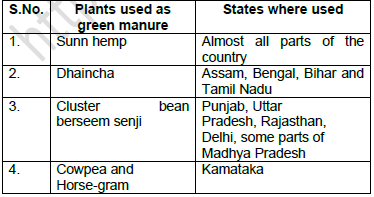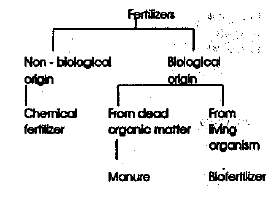Food is needed by all living organisms for their existence. The food consists of carbohydrates, proteins, vitamins, minerals and water which are needed to perform several functions and all bodily structures are built from the food materials.
Human dependence on plants and animals for food
Since green plants are able to synthesize food from CO2 and H2O during photosynthesis, beings are dependent on plants. The root, stem, leaf, flowers, fruit an seeds, of some plants are used as food.
Fruits: apple, grapes, guava, tomatoes, Pumpkin, cucumber etc. Seeds: cereals – maize, rice, wheat etc. Pulses: gram – green gram, pea etc. Vegetable: Roots – beet root, carrot Onion, potato Leaf, stem and flower: cabbage, cauliflower, lettuce etc.
Some type of animals also for human. Since time immemorial man has been involved in farming and rearing of animals to meet their food requirements. Animals produce mil, butter, egg, meat etc., which have been used by human to supplement his food demand.
Since plants form major source of food it is imperative to increase the production of crops to meet the food requirement of the growing populating. Hence it is essential to know, good farming practices and managing resources such as nutrients and water which would lead to increased yield per unit area of land. Agriculture is an applied science which deals with production of useful animals and plants in mass scale.
Good crop production requires proper management of resources like nutrients and water.
8.1 Nutrients as food for plant
Any plant, not to say a crop plant, needs at least these elements for a healthy growth. These are Carbon (C), Hydrogen (H), Oxygen (O), Nitrogen (N) Phosphorus (P), Sulphur (S), Potassium (K), Calcium (Ca), Magnesium (Mg), iron (Fe), Manganese (Mn), Zinc (Zn), Copper (Cu), Molybdenum (Mo), Boron (B) and Chlorine (Cl).
The minerals (macro and micro nutrients) are required by the plants either in large quantities or trace amounts without which, they are unable to complete the life cycle. The deficiency of a particular nutrient can be corrected only by providing that nutrient to the plants and they have a direct effect on the metabolism of plants. The three sources from where the plants obtain their minerals (nutrients) are soil, air and water. However, the nutrients taken from soil is more than that are obtained from air or water.
Carbon needed by plants is obtained from CO2 of the air, hydrogen and oxygen from water. The rest are all taken from the soil. Iron, manganese, copper, zinc, boron, molybdenum and chlorine and micronutrients, required by the plants only in trace quantities while all the others are taken in large quantities and hence, called macronutrients. Thus a plant lives in an environment of air and water, with the soil serving as the source of water and mineral nutrients.
Increased crop production is necessary to meet the demanding food requirement of our population. Crop production involves the exploitation of plant responses within the soil and environment to produce a high yield per unit area of land.
Any soil continuously under cultivation needs to be augmented and restored. It is in this context that the system of farming, soil management and manuring practices etc., influence the productivity of soils.
8.2 Types of manure And fertilizers
Indian soils are very poor in organic matter as well as in nitrogen. Materials employed for maintaining or improving soil fertility may be classified as manures, fertilizers, biofertilizers and organic fertilizer.
8.2.1 Manures
These are the bulk materials such as animal manure of green manures. Their addition to the soil improves its physical condition, replenishes and keeps up its humus status, maintains the optimum conditions for the activities of soil microorganisms.
Manures such as farmyard manure and compost enrich the soil with different kinds of nutrients, hence manures are needed in large quantities. Manures also improve the water holding capacity of the sandy soil and aeration and drainage in clayey soil as they add organic matter to the soil. The organic content of the manure form food for micro-organisms and the micro-organisms are helpful in releasing the nutrients by their degrading activity.
Manures include farmyard manure (FYM), compost, green manure, vermicompost etc. Farmyard Manure: Good-quality farmyard manure is perhaps the most valuable organic matter applied to a soil. It consists of a mixture of cattle during, the bedding used in the stable and of any remnants of straw and plant stalks fed to cattle. The cattle dung, together with stable waste and house sweepings, are first collected and deposited in a pit which is compacted. The compacting should be sectional. When each section is filled with the wastes, it should be plastered with a mixture of mud and dung in equal proportions. Before plastering, four of five buckets of water should be added to the manure in the pit. Plastering conserves moisture and nitrogen and also prevents the housefly menace. The manure becomes ready for use in about four to five months after plastering. Farmyard manure must have moisture for its roper rotting. Dried farmyard manure loses quite a lot of its nitrogen and ammonia content. Farmyard manure should ideally be used with superphosphate, as the manure is generally deficient in phosphates. A well decomposed FYM has 0.5% N, 0.2% P
2O
5 and 0.5% and 0.5% K
2O.
Compost: Compost is prepared from farm and two refuse like vegetable and animal refuse, sewage waste, weeds, crop stubble, straw, groundnut husk, farm weeds, grass, litter, etc. Both aerobic and anaerobic methods of decomposition occurs in converting these materials to manure with the help of micro-organisms.
A trench of about 4 to 5 m long and about 1.5 to 1.8 m broad and about 1 m to 1.8 m, deep is dug. The wastes are dumped and allowed to build upto a pile of about 30 to 45 cm in height. The pile is built up before the start of the rainy season. The pile is turned with rake to a heap to prevent loss of moisture and ensure a quick start of decomposition. The pile is turned every two to three weeks so that there is mixing of the material from outside to the inside. The compost becomes ready for use in about four months. Farm compost contains 0.5% N, 0.15% P2O5, 0.5% K2O.
Compost prepared from town refuse (Garbage) contains 1.4% N, 1.0% P2O5 and 1.4% K2O.
Another method is one where the wastes after deposition are compacted with a mixture of mud and cow dung. Under such conditions, decomposition is anaerobic and high temperatures do not develop. The compacted moist material becomes composted in about four to five months without any further attention.
Green manure: Green manure consists of planting a quick growing crop and ploughing it under to incorporate it into the soil. The green manure crop supplies organic matter as well as additional nitrogen, particularly if it is a legume crop, which has the ability to acquire nitrogen from the air with the help of it root nodule bacteria. The green manure crops also exercise a protective action against erosion and leaching.
The crops most commonly used for green manuring in this country are the following.
Sunn hemp (Crotakaria juncea), dhaincha, (sesbania aculeate), senji (melilotus parvifora), cowpea (vigna catjang), horse gram (Dolichos biflorus), pillipesara (Phaseolus trilobus) and lentil (Lens esculenta).

Table showing the areas where different types of plants are used as green manure.
For the proper rotting of the green manure, it is necessary that the green material should be succulent and there should be adequate moisture in the soil.Plants at the flowering stage, contain the greatest bulk of succulent organic mater
with a low carbon/ nitrogen ratio. The incorporation of the green manure crop into the soil at this stage allows a quick liberation of nitrogen in the available form.The increase of yield after green manuring is usually of the order 30 to 50 percent.
Vermicomposting: vermicomposting is the process of using worms and microorganism to turn kitchen wastes into black, earthy smelling nutrient rich humus.The worms used in vermicomposting are called red worms (EISENIA FOETIDA) which is also known as red wrigglers or manure worms.
The materials to be degraded (kitchen wastes in general) are taken in a container/bin/woodbin whose bottom can be moved. The base of the container is liner with small stones or boards to keep away other worm-loving creatures from entering into the bin. The bin is lined with a bedding, which may be composed of shredded newspaper, corrugated cardboard or peat mos. The type of bedding used,must be able to absorb maximum quantity of water and retain both moisture and air. The kitchen wastes are introduced into the bind which consists of all vegetable and fruit wastes, coffee grounds and tea bags. As the vermicomposting worms are not tolerant to garlic and onion skin, addition of these is avoided. The worms are introduced into the bin and the temperature is maintained between 55 and 77°F. The worms have gizzard like structure hence fine gritty material like cornmeal, coffee ground or finely crushed egg shells are added. Addition of fat rich material, meat scraps or bones, quicker composting process, plastic bags, rubber bands, sponge, aluminium foil and glass pieces should be avoided.
At the given right environment, the worms digest the kitchen scraps and bedding faster than any other compost method. The material passes through the worms body ad become ‘castings’. In 3 or 4 month the worms digest nearly all the garbage and bedding and the bin will be filled with a rich black natural fertilizer and soil amendment. Compared to ordinary soil, the worm castings contain 5 times more nitrogen, 7 times more phosphorous and 11 times more potassium. They are also rich in scale depending on the structure o the soil. Vermicomposting can be done by availability of wastes available at a given time on a large scale, the same process is done b adding the material to be decomposed into a deep pit in the comer of th field or garden.
8.2.2 Fertilizers

Fertilizers have become a major factor in improved agriculture and increased production. Constant use of land leads to the loss o its important nutrients particularly, nitrogen and phosphorus and thus loses its fertility. Chemical fertilizers
in terms of nitrogen and phosphorus are applied to the land so that it regains its fertility.
The total consumption of fertilizers in our country is about 9.2 million tones and is expected to increase to about 20 million tones. In India, the average consumption of fertilizers is about 35 kg per hectare. China uses four times the amount of fertilizers that Indian uses per hectare of arable land.Need for the Application of Fertilizers
Deficiency of any one or more of the nutrients in the soil impairs the growth and development of the plant. Ultimately the yield of the crop plant is affected.The plants develop characteristic symptoms due to the deficiency of nutrients. These are called deficiency symptoms or “Hunger signs” of crops, Amongst the macro-elements, Nitrogen (N), Phosphorus (P) and Potassium (K) are required in much larger amounts for plants, referred to as NPK, these are also called the primary elements,
Fertilizers are generally grouped as:
(i) Nitrogenous Fertilizers
(ii) Phosphate Fertilizers
(iii) Potassium Fertilizers
(iv) Complex Fertilizers

